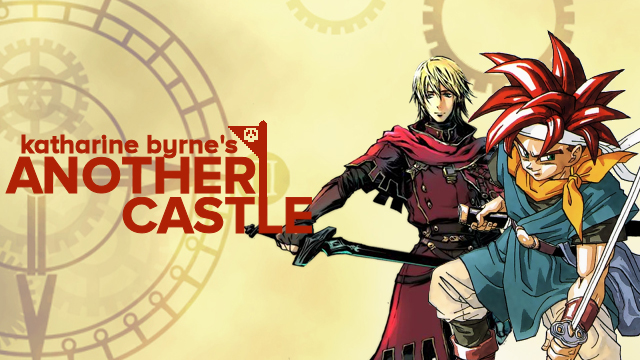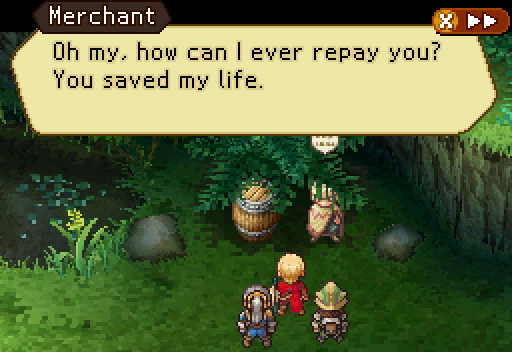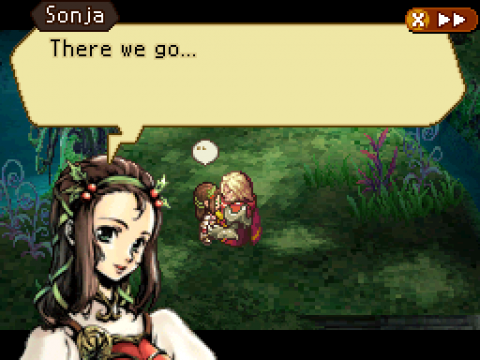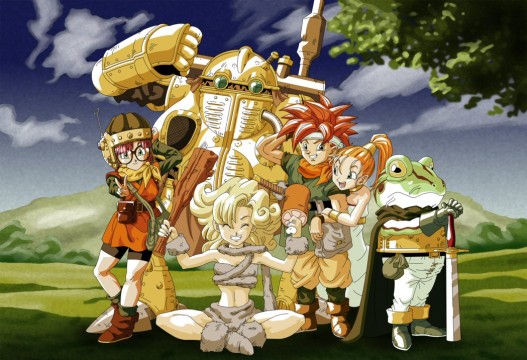
When you think of JRPGs, you often think about time. Whether it’s the time taken to complete it, or the number of hours you’ve spent level-grinding, anyone who’s encountered at least one JRPG will know time’s wingèd chariot is never too far from your mind. But while some JRPGs make it seem like time is often running away from us, there are others which grab it firmly by the horns and put it right back into the palm of our hand, giving us the power to control time and space within the game itself. Games like Chrono Trigger and Radiant Historia.
Now many consider Radiant Historia to be the spiritual successor to Square’s SNES classic, and the similarities between the two certainly aren’t lost on me. They both involve time travel and they both allow players to make (relatively) meaningful choices about how they play through their respective stories. Another common opinion, however, seems to be that Radiant Historia also isn’t as good as Square’s timeless classic, but I actually think the opposite is true. Granted I’ve haven’t yet completed Radiant Historia, but from what I’ve played so far I think it’s shaping up to be a far more interesting game about time travel than its revered ancestor ever was, and that largely comes down to its two parallel timelines.
Unlike Chrono Trigger‘s straightforward mix of travelling from one age to another along the same linear timeline, Radiant Historia is based off the idea of “what if…?” What if I’d stayed with my old unit? What if I’d joined my friend’s new brigade instead? What would have happened then? How would our lives have been different? Those are the kind of questions it asks throughout the game, allowing you to explore different outcomes based off certain decisions you make. Some lead to automatic game overs, others advance the story, and some events can even affect what happens in the other timeline.

Stocke and friends save the day just in time– but only in the Standard History.
In the Alternate History, for example, our protagonist Stocke has left Specint, Alistel’s special intelligence unit, to join his friend Rosch in the army, and he soon finds himself in Alma Mine waiting for some explosives to blast open the entrance. The only problem, though, is that the explosives merchant was killed en route in this timeline because he was attacked by bandits on the road. Jump over to the “Standard History”, however, where Stocke’s still with Specint, and he ends up saving the merchant on one of his missions, who’s then able to carry on to the mines to help blow up the entrance in the other timeline.
Still with me? Good. It can be slightly more brainache-inducing than Chrono Trigger, but the thing that interests me about Radiant Historia‘s take on time travel are those names, “Standard” and “Alternate”. You may think they’re just labels to help you distinguish one timeline from the other, but to me, the word “Standard” suggests that this is the normal or original timeline– what would have happened anyway, so to speak. “Alternate”, on the other hand, gives the impression that this timeline is only secondary to the Standard one– it’s the “other” version of events as opposed to the “proper” one– and this implies it probably wouldn’t have happened the grand scheme of things. Viewed in this light, then, these two labels put a completely different spin on your actions, particularly those you undertake in the Alternate timeline.
For instance, you’re eventually given the opportunity to get Rosch to admit his feelings for Sonja, a doctor in the Alistel military that he’s been close friends with since childhood. You’re alerted to this by having a small conversation with Sonja’s colleague, Meese, but you can only do this in the Alternate timeline as you’re off infiltrating Grangorg in the Standard one. But if the Alternate timeline isn’t technically meant to happen, what does this mean for Sonja and Rosch? Are they not meant to be together either? How heartbreaking is that!?

Is one chance at happiness worth a hundred deaths? It’s your call.
This is made all the more poignant when Stocke meets Vanoss, a member of the Satyros tribe whose young niece Aht is able to bring back souls from the dead. When he asks Stocke to help keep Aht from misusing her powers and straying from the “right path” (which is ironic, really, considering this is also in the Alternate History), he says:
He may be talking solely about Aht’s power to bring back the dead at this point, but it also strikes right at the heart of what Stocke has to do throughout the entire game– using the Alternate History to correct the “unnatural” deviations in the Standard History, and vice-versa, in order to find the “true” history and save the world from the brink of destruction. It makes you wonder just how much “distortion” Stocke himself has created along the way, because not only has he done a bit of “unnatural correction” already at this point by going back in time to save Rosch from dying, he’s also spurred a potentially unnatural relationship into motion as well. Yet how can it not be right to save your best friend from dying on the battlefield? Is it right to prevent him from being happy too?
In a way, it makes me want to say that both paths are “right”, but as those of you who’ve played the game will know, the Alternate History sees its fair share of bloody battles, and the skirmish where Stocke saves Rosch is particularly gruelling as it results in both the death of his faithful friend Kiel and the demise of his entire brigade, sending Rosch in a spiralling depression soon afterwards. But if Stocke’s ever going to find the true path to salvation– something he can only achieve by jumping back and forth between each timeline– then all this suffering and despair must be “right”… right?
But this isn’t even the most difficult question that Radiant Historia asks its players, as the same meeting with Vanoss in the Alternate History also casts a shadow over whether Stocke is actually erasing more history than he’s creating. This isn’t the first time that Stocke’s met Vanoss, after all, as he also encounters his troupe of travelling performers earlier in the Standard History when he needs to bypass an enemy checkpoint. But when we meet Vanoss again in the Alternate History, his memory of this event is almost non-existent. He vaguely recalls taking someone along with his troupe another time, but he doesn’t remember Stocke or any of his fellow party members, and the entire memory is just a hazy blur. Stocks may be able to influence events in either timeline, but does this mean that he also erases the memories of those he meets when he travels from one timeline to the other? Of course, this may be a blessing in disguise given the grim nature of the Alternate History, but it also feeds right back into this idea of unnatural distortion and destruction. It may be unintentional, but if sacrificing people’s memories is the only way to save the world from total annihilation, what does this say about the supposed “true” path to salvation? Does this make it any less wrong or right? Personally, if it’s a history full of lost memories, I’d be inclined to say the latter.

Well, if you’d been to the year 65,000,000 BC and back, I’m sure you’d pick up a few colourful characters too!
Chrono Trigger, on the other hand, is a little lighter on the moral dilemma front, but it still uses several common time travelling tropes to ask its own questions about the ethics of altering history. It’s opening gambit, for instance, is the classic “grandfather paradox” (i.e.: what would happen if you went back in time and killed your own grandfather?) where Marle disappears from existence after being mistaken for her kidnapped ancestor Queen Leene in 600 AD. With the real Leene still missing, this means that Marle and the rest of her family will never be born, so unless Crono and Lucca save Leene from being killed at the hands of Magus, Marle will never return to the present day.
Of course, this all happens by accident thanks to Lucca’s telepod malfunctioning at the Millennial Fair in 1000 AD, but this grandfather (or grandmother) paradox shows just how easily things can start to unravel if you try interfering with history. Then again, Chrono Trigger also presents us the flip-side of this argument, since if it wasn’t for another rather haphazard jump through time to help get Crono out of present-day prison, they would never have discovered how Lavos wiped out nearly all human existence in 1999 AD, and they would never have made their vow to alter their fate and save the world from being destroyed. Marle may have nearly written herself out of existence, but if the same kind of chance encounter also ends up saving the world, then I’m all for a bit of potential timeline-meddling.
But even though Chrono Trigger seems like a grand roller-coaster ride through several thousand millennia, most of the game also happens in a very specific order. The story guides you from one place to the next as you try and find out the origin of Lavos, and the actual ability to “travel through time” (at least on your first playthrough) is a bit of an illusion, really, as you’re essentially just following the set story like any other JRPG until you obtain the Epoch right at the end of the game (and even then the so-called game-altering choices on offer are relatively inconsequential).
The same goes for Radiant Historia as well, though, as there are multiple points where you simply can’t progress any further until you complete a certain task in the other timeline (unless, of course, you want an instant game over). But while this also makes Radiant Historia quite a linear time travelling experience, at least it gives players a little more control over which history they choose to pursue first. Certain plot points may have to be completed either way, but thanks to the two parallel timelines I think Radiant Historia is ultimately a little more fluid than Chrono Trigger when it comes to the actual notion time travel (if only by a small margin), and for me this gives it another edge over its popular ancestor.
As much as I love Chrono Trigger, then, the winner for best time travelling story has to be Radiant Historia in my books. Both games may use time-honoured time-travelling staples to help shape their respective narratives, but I think Radiant Historia goes one step further by developing those ideas within its story to pose much bigger questions to its audience. Chrono Trigger, on the other hand, feels slightly dated nearly twenty years down the line, as it never really takes its idea of time travel much further than what’s been done before. It’s an incredible game, don’t get me wrong, but for me, Radiant Historia clocks in just a little bit higher.




 ShareThis
ShareThis






